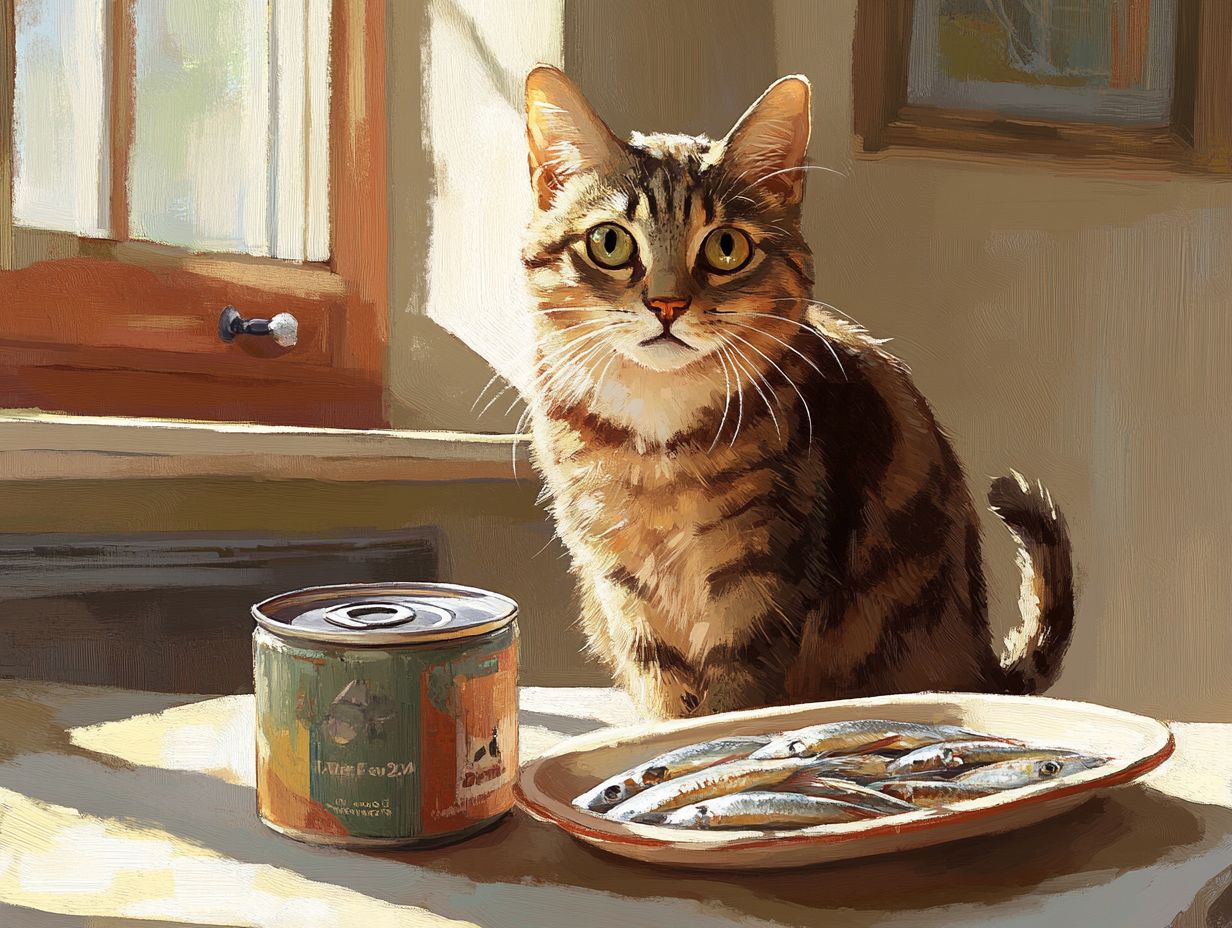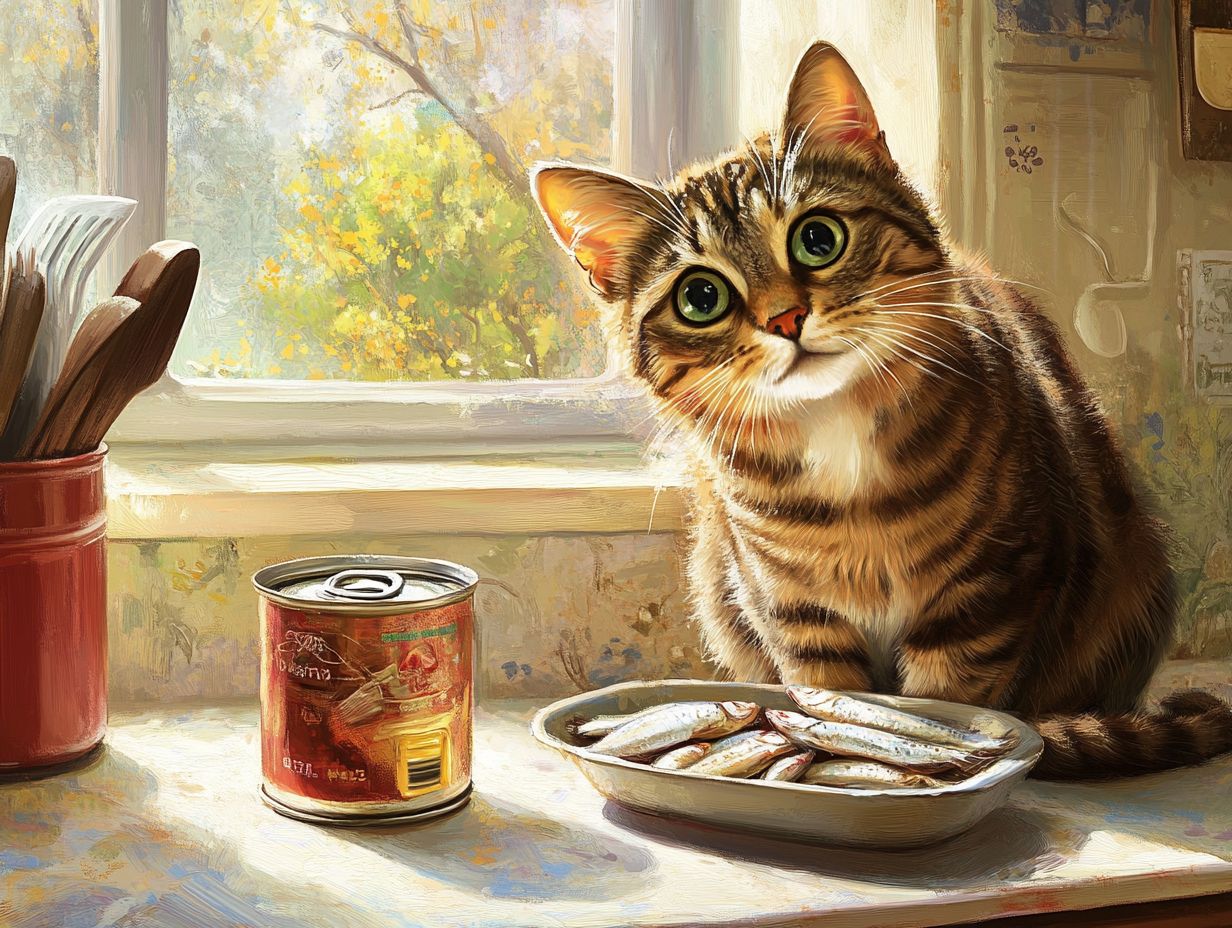Sardines are more than just a tasty treat for your feline friend; they pack a powerful nutritional punch that includes essential amino acids and vitamins, enhancing your cat’s health in several ways.
Rich in protein, taurine, and omega-3 fatty acids, these small fish can support everything from a shiny coat to a robust immune system and even improve heart health.
It’s essential to be aware of potential risks, such as mercury contamination and thiamine deficiency.
This article explores how to safely incorporate sardines into your cat’s diet, along with alternative options for ensuring they receive the vital nutrients they need.
Read on to discover how sardines can be a beneficial addition to your cat’s meals, offering health-conscious pet owners a nutritious and safe option.
Key Takeaways:

The Nutritional Value of Sardines for Cats
Sardines are a highly nutritious food source for cats, offering essential nutrients such as protein, omega-3 fatty acids, vitamins, and calcium that contribute significantly to their overall health, supporting bone health and kidney function.
These small fish are rich in high-quality protein and taurine, both of which are vital for a cat’s muscle development and energy levels. Additionally, sardines contain omega-3 fatty acids that promote heart health and reduce inflammation, making them an excellent addition to a balanced diet that supports cognitive health and kidney support.
Understanding the specific nutritional value of sardines is essential for cat owners who wish to effectively incorporate them into their pets’ feeding regimen.
Protein and Amino Acids
Sardines are high in protein, which is essential for the growth and maintenance of a cat’s muscles and tissues, as well as for providing crucial amino acids like taurine. This vital building block supports not only muscle health but also the overall well-being of the cat.
For instance, taurine, abundant in sardines, has been shown to significantly impact heart health by helping to maintain proper heart function and reducing the incidence of various heart diseases. Additionally, taurine supports cognitive function and enhances memory and learning in cats, particularly as they age.
By offering protein-rich foods such as sardines, cat owners can help ensure that their pets have a balanced diet that promotes both physical and mental strength.
Omega-3 Fatty Acids
The omega-3 fatty acids found in sardines provide significant benefits for cats by reducing inflammation and promoting heart health. Essential fatty acids, particularly types of omega-3 fatty acids, play a crucial role in maintaining cardiovascular health by regulating blood pressure and cholesterol levels.
Research indicates that regular consumption of omega-3s can enhance cognitive performance, which is particularly beneficial for older cats, as it can improve their mental function and overall quality of life. Omega-3 fatty acids are often incorporated into cat food to help manage inflammatory diseases, as their anti-inflammatory properties alleviate joint pain and decrease the risk of chronic illnesses.
Including sardines in your cat’s diet can address immediate health needs while also contributing to long-term health benefits.
Benefits of Feeding Sardines to Cats
- 1. Skin and Coat Health: Feeding sardines can enhance your cat’s skin and coat, making them shinier and healthier.
- 2. Joint Function: The omega-3 fatty acids in sardines can promote joint health and alleviate pain, particularly in older cats.
- 3. Immune Support: Sardines boost the immune system, helping to keep your cat healthy and active.
Feeding sardines to cats offers several health benefits, including enhanced skin and coat health, improved joint function, and strengthened immune systems.
Sardines are rich in essential nutrients that support weight management and boost energy levels, making them a nutritious snack for pet owners with sardine-loving cats.
A balanced diet that includes sardines can help prevent obesity in cats and encourage them to exercise and develop properly.
Feeding Guidelines
When incorporating sardines into your cat’s diet, follow these guidelines:
- **Portion Size:** Limit sardine servings to once or twice a week.
- **Preparation:** Serve sardines fresh or canned in water without added salt.
- **Introduce Gradually:** Start with small amounts to see how your cat reacts.
- **Combine with Other Foods:** Mix sardines with regular cat food to encourage consumption.
Potential Risks
While sardines can be a healthy option, it’s important to be aware of the risks:
- Mercury Contamination: Symptoms of mercury poisoning can include tremors, loss of coordination, and changes in behavior. To mitigate this risk, consult your veterinarian before introducing sardines.
- Thiamine Deficiency: Excessive consumption of sardines can lead to thiamine deficiency, which can cause neurological issues. Monitor your cat’s health and consult a vet if you notice any concerning signs.
Conclusion
Sardines can be a nutritious addition to your cat’s diet, offering numerous health benefits. However, it’s crucial to feed them in moderation and consult with a veterinarian before introducing them to ensure a balanced diet and to mitigate potential risks. Remember, your cat’s health and well-being should always come first!
Improved Skin and Coat Health
The omega-3 fatty acids found in sardines can significantly enhance cats’ skin and coat health while reducing inflammation that may lead to skin issues. By incorporating these omega-3s into their diet, pet owners can anticipate noticeable improvements backed by reputable veterinary sources.
Omega-3s not only moisturize cats’ skin, alleviating cracking and irritation that cause discomfort, but they also contribute to a smoother, shinier coat. This enhancement in skin and fur condition can greatly improve a cat’s quality of life by boosting its energy and vitality.
A healthier skin barrier is more effective at absorbing essential nutrients, which supports the overall health and immunity of cats, making them more playful and energetic in their daily activities.
Joint and Muscle Health

Regularly feeding sardines to a cat can promote joint and muscle health due to the omega-3 fatty acids they contain, which help reduce inflammation. These essential fatty acids improve joint lubrication, which is crucial for preventing joint-related conditions such as arthritis.
By helping your cat move more easily, omega-3s enhance a cat’s mobility, making daily activities like jumping and climbing easier and more enjoyable. This improved joint function can significantly enhance a cat’s quality of life, increasing its activity levels and encouraging natural play behaviors.
Therefore, incorporating sardines into a cat’s diet can be a delicious way for owners to support their cats’ longevity and vitality. Feed your cat sardines 2-3 times a week, limiting serving size to 1-2 sardines depending on their size.
Boosted Immune System
Sardines are packed with essential vitamins and nutrients, making them an excellent addition to a cat’s diet for boosting their immune system. These small fish are particularly rich in omega-3 fatty acids, vitamins B12 and D, calcium, and selenium, all of which play a vital role in enhancing a feline’s immune response.
When included in their diet, sardines can improve overall health by increasing resistance to common illnesses and infections. These nutrients can also facilitate faster recovery if a cat becomes ill, effectively shortening the duration of health issues and promoting a quicker return to vitality.
As a result, feline caregivers may notice their pets displaying livelier behavior and an improved ability to fend off ailments.
Potential Risks of Feeding Sardines to Cats
Sardines provide several health benefits for cats; however, there are risks associated with feeding them, including mercury contamination and potential thiamine deficiency, as well as possible allergies, that owners should be aware of.
Understanding Mercury Contamination
One of the primary dangers of feeding sardines to cats is the elevated mercury levels, which can lead to health issues when consumed in excess. Mercury levels can vary between species and even within the same species, depending on their source. For instance, larger sardines that have lived longer tend to contain higher mercury levels.
This heavy metal can adversely affect a cat’s neurological and kidney function, potentially resulting in symptoms such as lethargy, tremors, and gastrointestinal distress. To mitigate these risks, sardine servings should be limited to a few times a week, and sardines sourced from the cleanest waters should be chosen.
Always look for low-mercury claims on the packaging and consult with a veterinarian regarding the appropriate dietary plan for your cat.
Recognizing Thiamine Deficiency
Feeding cats sardines in large quantities over time can lead to thiamine deficiency, resulting in serious health issues. Thiamine is a crucial B-vitamin that plays an essential role in energy metabolism and the proper functioning of the nervous system. Relying on sardines too heavily can disrupt the delicate balance of essential nutrients in a cat’s diet.
While sardines are a good source of protein and a tasty treat, to ensure overall health, it is important to use a variety of protein sources and incorporate high-quality commercial cat food that meets all nutritional needs. Maintaining this balance can be achieved by regularly rotating different protein sources and consulting with a veterinarian.
How to Safely Incorporate Sardines into a Cat’s Diet
Start by mixing a small amount of sardine into your cat’s regular food to see how they react. Gradually increase the amount over time as long as your cat shows no adverse reactions. Always ensure that sardines are boneless and packed in water or their own juice, avoiding any added salt or preservatives.
Incorporating sardines in moderation can benefit your cat’s health, but always consult your veterinarian for a balanced diet tailored to your pet’s needs.
Sardines can be a nutritious treat for your cat, but it’s essential to understand how to incorporate them safely into their diet. Sardines should be fed to cats in appropriate portions and at the correct frequency to ensure they receive the benefits without experiencing any adverse effects.
How Much and How Often to Feed

Proper portion sizes are essential for maintaining a healthy diet for cats when sardines are offered as a snack or treat. While cats typically thrive on a balanced diet that includes a variety of proteins, sardines can serve as an excellent source of nutrition in moderation. Small cats may enjoy half a sardine, while larger breeds can have one full sardine as an occasional treat, a few times a week, ensuring low sodium and low fat intake to prevent obesity and digestive upset.
For regular meals, portion sizes must be adjusted based on the cat’s overall caloric intake and specific dietary needs, generally allowing for one to two sardines per meal, depending on the cat’s size and activity level. Sardines should complement a nutritionally complete diet, rich in essential amino acids, which primarily consists of dry or wet cat food, to ensure optimal health and prevent obesity. Monitoring total caloric intake and sodium levels is crucial in preventing obesity while still permitting enjoyable treats.
Risks of Feeding Sardines
While sardines can be beneficial, there are potential risks to be aware of, including high sodium levels and mercury content. It’s advisable to consult your veterinarian before introducing sardines or any new food into your cat’s diet to ensure their safety.
Preparation and Serving Suggestions
Proper preparation and serving suggestions based on veterinary advice can enhance the enjoyment of sardines for cats while ensuring their safety and health benefits. Always choose sardines packed in water without added salt or spices and rinse them before serving to reduce sodium content.
For fresh sardines, cleaning and cooking them thoroughly will eliminate any harmful bacteria and toxicity, making them safe for feline consumption. When opting for canned sardines, it’s best to select those packed in water without added salt or spices to avoid digestive upset and potential allergies, as these can upset a cat’s digestive system.
To reduce the fishy odor, you might consider rinsing canned sardines under cold water before serving. Additionally, cutting the fish into bite-sized pieces can make it more appealing, encouraging cats and maintaining bone health to enjoy this nutritious treat more readily.
Alternatives to Sardines for Nutritional Benefits
Cat owners seeking alternatives to sardines and other seafood can find various fish options and supplements that replicate the nutritional benefits of sardines for their cats.
Other Fish Options
Other fish alternatives, such as salmon and tuna, can offer similar benefits for cats as sardines, with added kidney support. Many of these options have a high protein content and low fat, which is essential for maintaining muscle mass and energy levels in cats.
Salmon is particularly rich in omega-3 fatty acids, beneficial for joints and cognitive health, which are important for skin and coat health, and also contains elevated levels of vitamins B12 and D that support weight loss. While tuna also provides omega-3 fatty acids, it should be fed in moderation due to its mercury content and potential toxicity.
Supplements for Essential Nutrients
For cats that may not enjoy fish, supplements can provide essential nutrients such as omega-3 fatty acids, calcium, and vitamins vital for their health. These supplements come in various forms, including oils, treats, and powders, making them versatile additions to a feline’s diet.
Omega-3 fatty acids, commonly found in fish oil, can be replaced with algae oil, a plant-based alternative, which is rich in DHA and EPA—nutrients crucial for maintaining healthy skin and a shiny coat. Taurine supplements are important for heart health and vision and can be easily incorporated into meals.
Other options, such as probiotics, can aid digestion and decrease inflammation, while protein powders can assist with weight management by offering a healthy energy source without excess calories, aiding in weight management. By ensuring that cats receive these essential nutrients, pet owners can support their overall health, enhance energy levels, promote balanced weight, and protect kidneys.
Frequently Asked Questions
Can cats eat sardines?
Incorporating sardines into your cat’s diet can be beneficial when done correctly. Always prioritize their overall health by consulting with a veterinarian.

If you’re wondering whether cats can eat sardines, the answer is yes, they can safely enjoy sardines as part of a balanced diet, provided you follow recommended feeding guidelines.
What are the nutritional benefits of sardines for cats?
Sardines are a good source of protein, omega-3 fatty acids, and various vitamins and minerals that can benefit a cat’s overall health.
Feeding Guidelines
Offer sardines as an occasional treat, no more than once or twice a week, and limit portions to about a tablespoon.
How should sardines be prepared for cats to eat?
Sardines should be cooked thoroughly by baking or boiling without added salt, seasonings, or oil to ensure they are safe for your cat. They can be mashed or cut into small pieces for easier consumption.
Can cats eat sardines as a treat?
Yes, sardines can be fed to cats as an occasional treat. However, they should not make up a large portion of a cat’s diet as too much fish can cause health issues.
Are there any potential risks in feeding sardines to cats?
Sardines contain small bones that can be a choking hazard for cats. It’s important to remove these bones before serving sardines to cats. Additionally, high levels of mercury in fish can pose health risks, so moderation is key.
Are there any types of sardines that are better for cats to eat?
Fresh or frozen sardines are the best options for cats as they contain fewer preservatives and added ingredients compared to canned sardines. Look for brands that offer fresh or frozen sardines without added preservatives, such as BPA-free canned options or sustainably sourced products.
Conclusion
In summary, sardines can be a nutritious treat for your cat when fed in moderation and prepared safely. Always remove any bones and check for harmful additives in canned varieties.